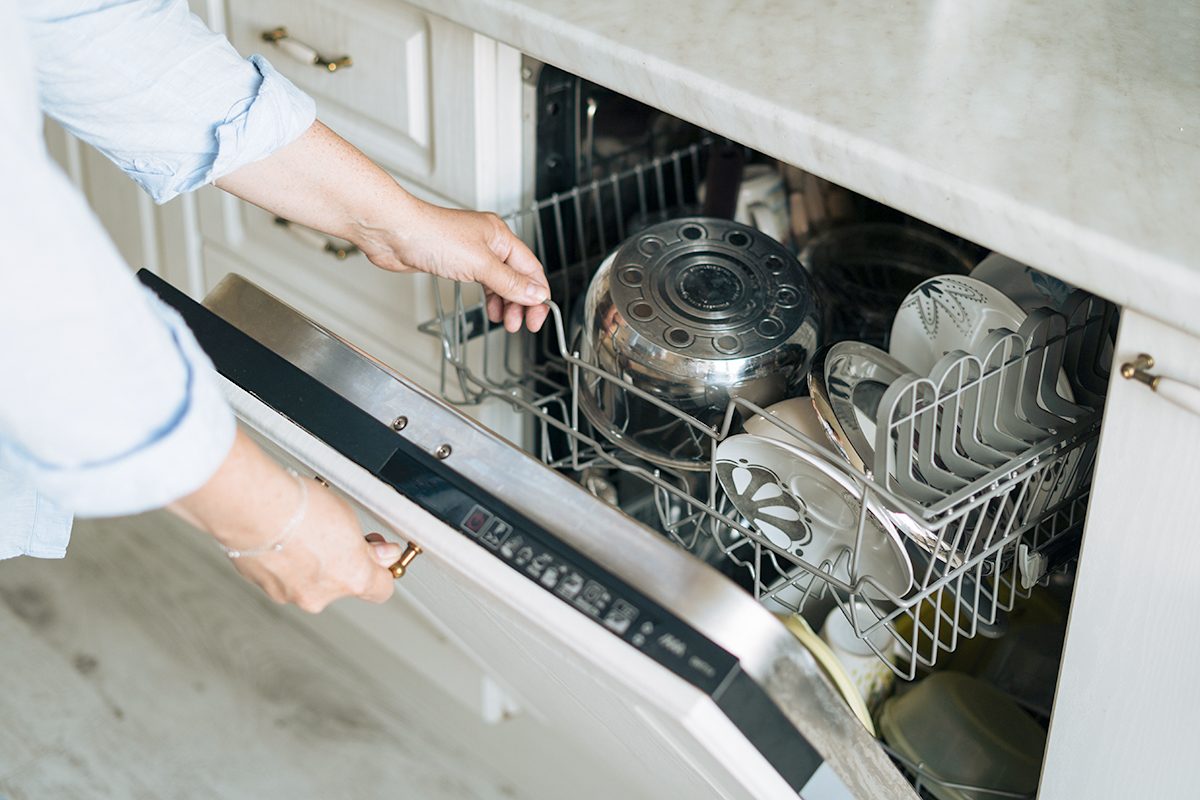Turns out, there's a "golden hour" for dishwashing

This Is the Best Time of Day to Run Your Dishwasher, According to an Appliance Expert

We all have our routines. Some are aspirational, like meal prepping or putting your phone away an hour before bed. Others are necessary, like loading the dishwasher and pressing “start” after dinner so you can wake up to clean forks.
But that simple push of a button? It turns out that timing matters more than you’d think. According to Aldo Ceja, a home-maintenance pro with Thumbtack, when you run your dishwasher can impact your energy bill, the temperature of your home and even how long your appliance lasts.
Read on to find out when that time is.
Get Reader’s Digest’s Read Up newsletter for more money-saving tips, humor, cleaning, travel, tech and fun facts all week long.
What is the ideal time of day to run your dishwasher?
“If your utility rate is based on time of use, then you have to pay attention to high usage hours,” says Ceja. “Basically, running your dishwasher when most people are likely to run it will cost you more, and when less people are likely to run it, it will cost you less.”
Utility companies do this to incentivize energy efficiency. For many households, the sweet spot when rates are lowered starts after 9 p.m. Why? That’s when demand for electricity drops; people are winding down, not firing up ovens or blasting the AC. Your dishwasher uses the same energy it always does—but off the clock, it’s a better deal for you, the consumer.
What is the worst time to run your dishwasher?

That post-dinner rush, from about 4 p.m. to 8 p.m., is what Ceja calls “prime time.”
“Everyone’s doing something that pulls power,” like cooking, watching TV and charging their phones, he explains. “So rates go up. And if your dishwasher’s kicking out heat during those hours, it’s also making your home warmer, which means in the summer months your air conditioner has to work harder.”
And that heat bump can add up. “You’re basically paying extra for your appliance to compete with your cooling system,” he says.
How much can you potentially save?
Electricity rates during peak hours can average around 23 cents per kilowatt-hour, while off-peak rates can drop to as low as 1.6 cents. Since the average dishwasher cycle uses about 1.8 kilowatt-hours, that’s a difference of roughly 38 cents per load. If you run your dishwasher five times a week, shifting to off-peak hours could save you close to $100 a year, just by choosing a better time to press start.
What’s a smart trick that can make this even easier?
If your dishwasher has a delay-start button, use it. Set it after dinner to kick on later that night, then go live your life. “It’s one of the easiest ways to save energy without changing your routine,” Ceja says.
Many newer models also offer app-based scheduling, which is perfect for those who want to time their cycles without hovering in the kitchen.
How else can you save?
Ceja shared a few bonus tips to help your dishwasher run better and longer and save you a little more along the way:
-
Run only full loads. Half loads still create full water waste.
-
Clean your dishwasher monthly. A vinegar rinse or dishwasher cleaner can prevent gunk and odor. Don’t forget to clear out the filter.
-
Wipe the seals. Mold loves a rubber gasket.
-
Check for clogs. If your dishes are still dirty, look at the filter or spray arms.
-
Hear a weird rattle? Something may be stuck or loose, and catching it early helps.
Running your dishwasher isn’t just about clean plates; it’s also a chance to save money, reduce wear and outsmart your utility bill. Sure, it’s just a dishwasher cycle, but it’s also an energy hack hiding in plain sight.
RELATED:
- The Most Surprising Appliances You Need to Unplug Before You Leave for Vacation
- If Your House Was Built in the ’50s or ’60s, You Might Have This Unique Feature in Your Bathroom
- This Clever Aluminum Foil Hack Can Keep a Very Dirty Part of Your Kitchen Clean
About the expert
|
Why trust us
At Reader’s Digest, we’re committed to producing high-quality content by writers with expertise and experience in their field in consultation with relevant, qualified experts. We rely on reputable primary sources, including government and professional organizations and academic institutions as well as our writers’ personal experiences where appropriate. We verify all facts and data, back them with credible sourcing and revisit them over time to ensure they remain accurate and up to date. Read more about our team, our contributors and our editorial policies.
Source:
- Aldo Ceja, home-care expert at Thumbtack; interviewed, July 2025























